
Resources
for You and Your Team
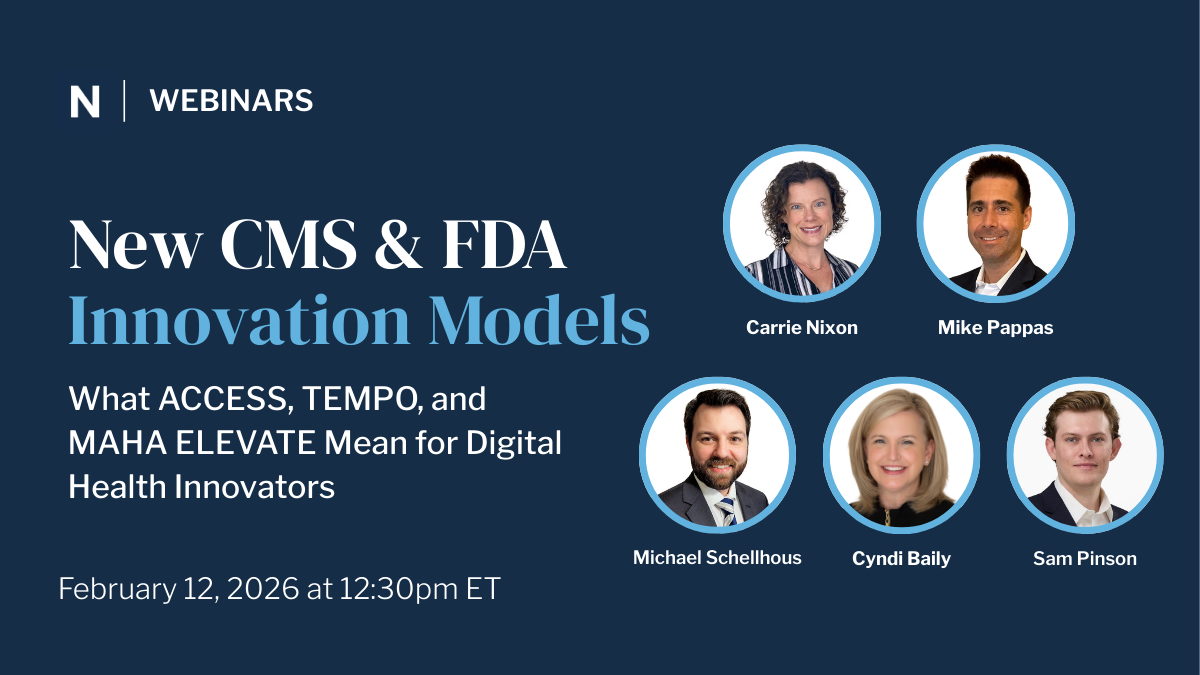
New CMS & FDA Innovation Models: What ACCESS, TEMPO, and MAHA ELEVATE Mean for Digital Health Innovators
CMS and FDA introduced ACCESS, TEMPO, and MAHA ELEVATE, three major innovation models that signal a shift in how federal agencies are thinking about digital health, care management, and reimbursement. In this webinar, Nixon Law Group’s attorneys break down what each model does, what types of entities can participate, and where we see concrete opportunities for digital health companies to engage.

Women’s Health & FemTech in 2026: 5 Compliance Pillars for Founders
In 2026, compliance is a competitive advantage in women’s health and FemTech. This article breaks down five critical pillars founders must address—from reproductive data privacy and FDA regulation to AI governance, corporate practice of medicine, and intellectual property strategy—to build trust, attract investment, and scale responsibly.

National Privacy Day: A Data Privacy Check-In for Digital Health and Wellness Companies
Is your digital health privacy strategy keeping pace with your technology? On National Privacy Day, we explore why privacy is a core business driver for telehealth, AI, and RPM innovators. From navigating the intersection of HIPAA and state consumer health laws to managing AI data governance and FDA cybersecurity, discover the five critical questions every healthcare leader must answer to ensure compliance, investor confidence, and long-term scalability.

FDA Relaxes Clinical Decision Support and General Wellness Guidance: What It Means for Generative AI and Consumer Wearables
In January 2026, FDA issued major updates to its Clinical Decision Support and General Wellness guidance, signaling a more innovation-friendly approach to generative AI, clinical copilots, and consumer wearables. This post explains what changed, which AI tools can now remain outside FDA regulation, and how digital health companies can design for compliance while accelerating time to market.
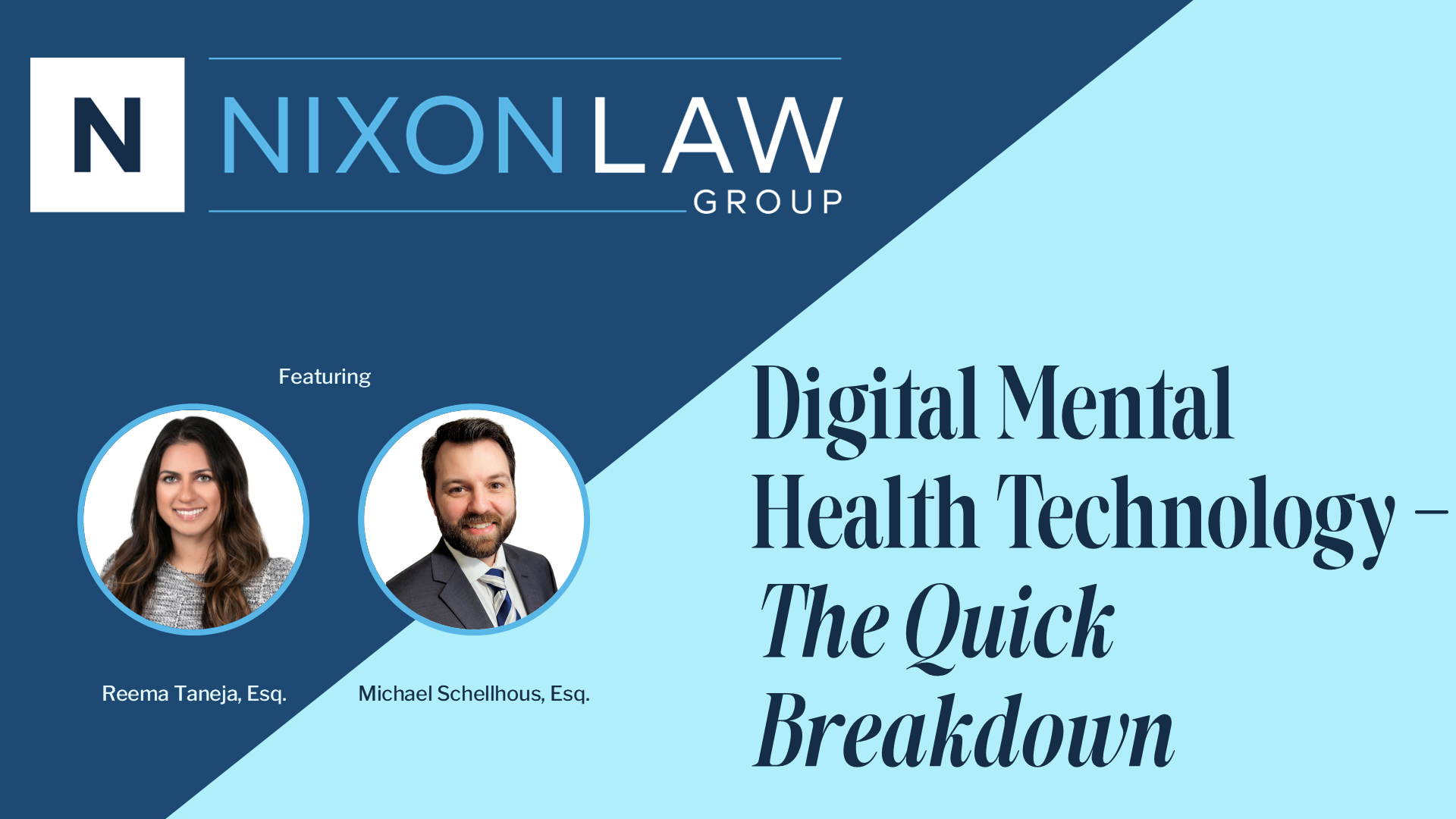
Digital Mental Health Technology - The Quick Breakdown
In this rapid-fire breakdown, Nixon Law Group Senior Counsel Reema Taneja and Digital Health Expert Michael Schellhous cut through the noise to explain the critical shifts in Digital Mental Health Treatment (DMHT) codes.
They cover what the DMHT codes actually reimburse, how they fundamentally differ from Remote Patient Monitoring (RPM) and Remote Therapeutic Monitoring (RTM), and the strict FDA/CMS requirements your device must meet. They unpack the major hurdles—from the lack of a national payment amount (MAC contractor pricing) to provider uptake challenges—and advise founders on how to position their companies for success despite these limitations.
This video is an essential resource for founders looking to understand the pathway to reimbursement and influence the future of digital mental healthcare policy.
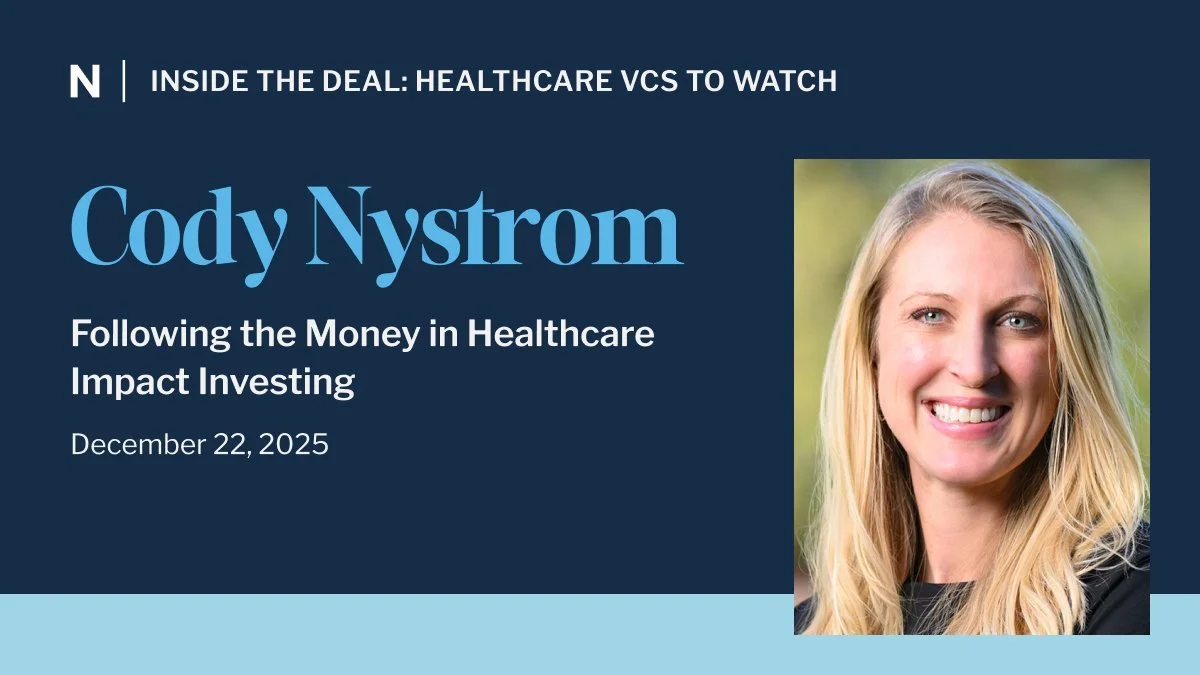
Inside the Deal: Healthcare VCs to Watch with Cody Nystrom – Following the Money in Healthcare Impact Investing
In this episode, we’re joined by Cody Nystrom, Managing Director at SJF Ventures, one of the nation’s longest-running impact investment firms. With nearly two decades of experience investing across healthcare, climate tech, and education, Cody shares how she evaluates founders building at the intersection of financial returns and measurable social impact.
From women’s health to behavioral health, Cody reveals why understanding reimbursement, regulatory shifts, and payer incentives is critical to scaling sustainable innovation.

CMS Announces MAHA ELEVATE Model: A New Opportunity to Shape Reimbursement for Lifestyle, Functional, and Whole-Person Care Services
CMS’s new MAHA ELEVATE Model offers $100M in funding to evaluate evidence-based lifestyle, functional, and whole-person care interventions not currently covered by Medicare. Launching in 2026, this initiative creates a pathway for healthcare innovators, digital health companies, and care organizations to influence future Medicare coverage and reimbursement for chronic disease prevention and management.

The 2026 MPFS Final Rule: A Pivot Point for Digital Health in RHCs and FQHCs
The CMS CY 2026 MPFS Final Rule ends simplified G-code billing (G0071, G0512) for safety net providers. FQHCs and RHCs must shift to granular CPT/HCPCS coding for virtual check-ins, Chronic Care Management (CCM), and Behavioral Health Integration (BHI). This structural change is a major product roadmap update for digital health vendors serving the rural and community health market. Learn the 4 key billing changes to maintain revenue for your RHC/FQHC partners.

2026 Medicare Final Rule Part 1: Rapid-Fire Q&A on RPM and RTM Codes
The 2026 Medicare Physician Fee Schedule (MPFS) Final Rule introduces some of the most consequential updates for Remote Physiologic Monitoring (RPM) and Remote Therapeutic Monitoring (RTM) since their inception. In Part 1 of our rapid-fire video series, health law experts Carrie Nixon and Reema Taneja break down the most significant changes impacting digital health innovators and care management companies.
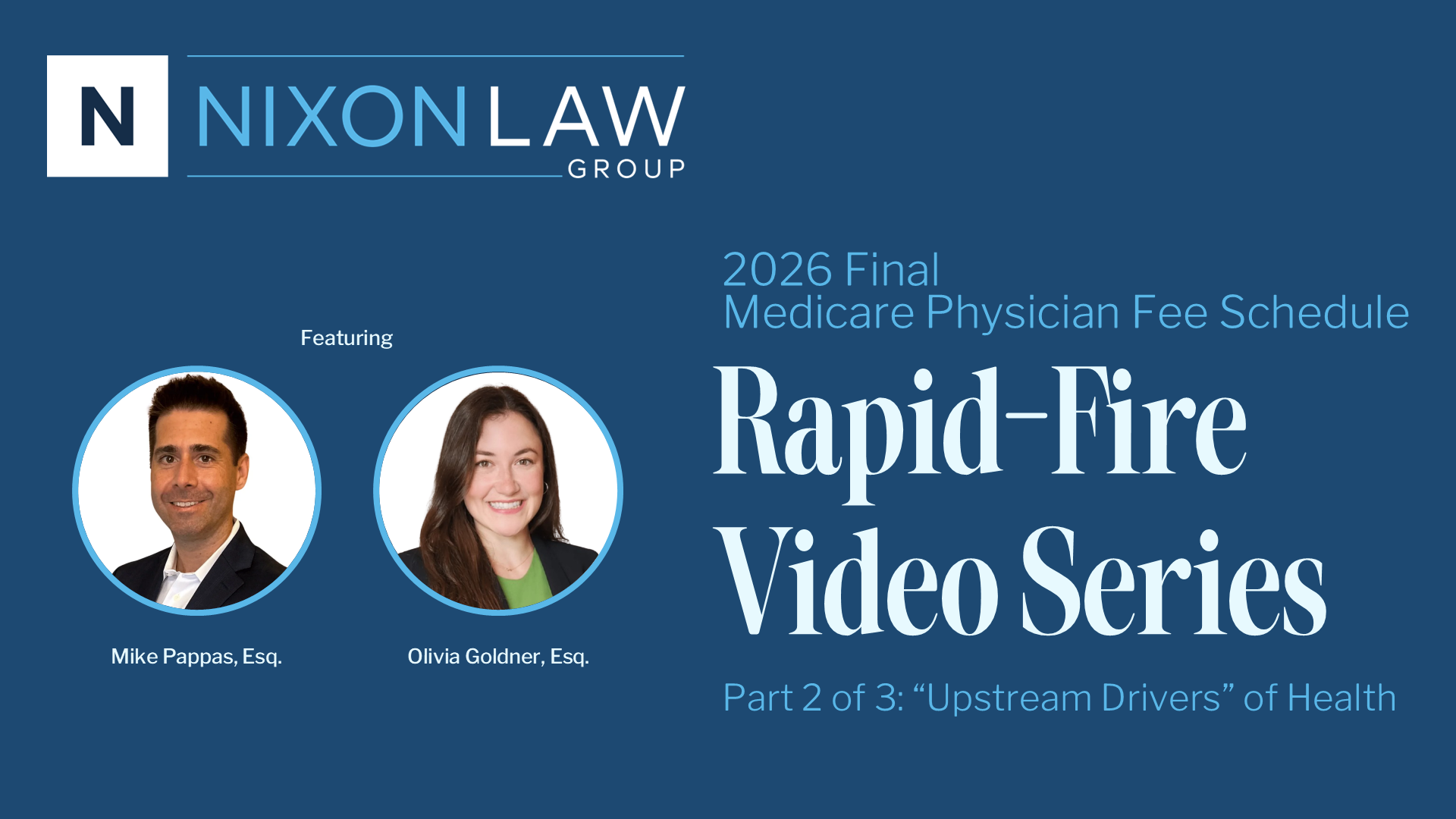
2026 Medicare Final Rule Part 2: Rapid-Fire Q&A on Upstream Drivers of Health
The 2026 Medicare Physician Fee Schedule Final Rule confirms CMS’s strong push toward whole-person care, creating new reimbursement pathways for models focused on nutrition, physical activity, and social supports. In Part 2 of our series, Mike Pappas and Olivia Goldner analyze the updates to "Upstream Drivers of Health."

2026 Medicare Final Rule Part 3: Rapid-Fire Q&A on FQHC and RHC Bundled Code Unbundling
Rural Health Clinics (RHCs) and Federally Qualified Health Centers (FQHCs) face mandatory billing changes in the 2026 Medicare Physician Fee Schedule (MPFS) Final Rule. In Part 3 of our series, Stephanie Barnes and Sam Pinson break down the crucial compliance and billing updates that will affect virtual care and care management services in these settings.
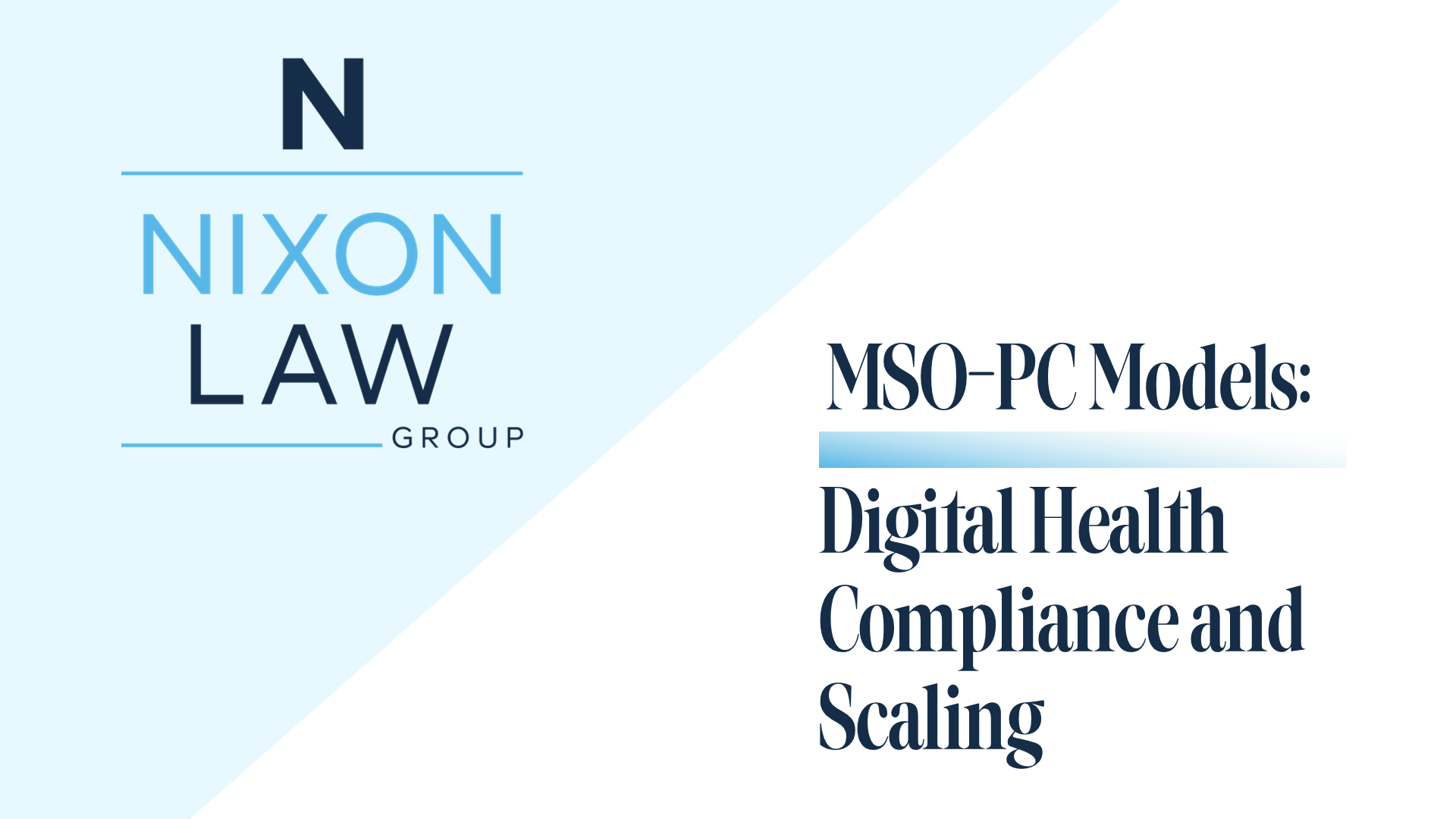
MSO-PC Models: Digital Health Compliance and Scaling
Navigating the complex legal landscape of digital health requires a robust and compliant corporate structure. In this video, Nixon Law Group Senior Counsel Reema Taneja provides a comprehensive 101 on the Managed Service Organization (MSO) – Professional Corporation (PC) model, focusing on the critical regulatory hurdles of the Corporate Practice of Medicine (CPOM) and the Anti-Kickback Statute (AKS).

FDA Launches TEMPO: What Digital Health Innovators Need to Know Now
FDA’s new TEMPO pilot creates a flexible, real-world evidence pathway for digital health, SaMD, DTx, wearables, and AI-enabled devices—aligned with CMS’s ACCESS model. Learn how innovators can use enforcement discretion to deploy faster, collect RWD/RWE, and strengthen future FDA submissions.

Inside the Deal: Healthcare VCs to Watch with Kapil Desai – Growth-Stage Capital That Scales
We’re joined by Kapil Desai, Partner at Catalyst Investors, a growth-stage fund focused on scaling high-impact companies in healthcare and beyond. With 11 years at the firm and a family of clinicians behind him, Kapil offers founders a sharp mix of operational insight and provider empathy.
In this episode, he shares how Catalyst evaluates readiness to scale, why capital strategy should serve the business (not the other way around), and what it means to "earn the right to win."

CMS Launches ACCESS Model: The Tools Directory Opportunity for Digital Health Vendors
The CMS ACCESS Model is a 10-year Medicare payment demonstration promoting outcomes-based reimbursement for chronic care management. For digital health vendors—from remote monitoring and wearables to interoperability platforms—the accompanying ACCESS Tools Directory creates a critical, new entry point into the Medicare ecosystem. This post breaks down the shift to Outcome-Aligned Payments (OAPs) and provides a compliance-forward strategy for listing your technology in the Directory to gain visibility and establish trust with Access Model Organizations (AMOs) before the July 1, 2026, launch.
